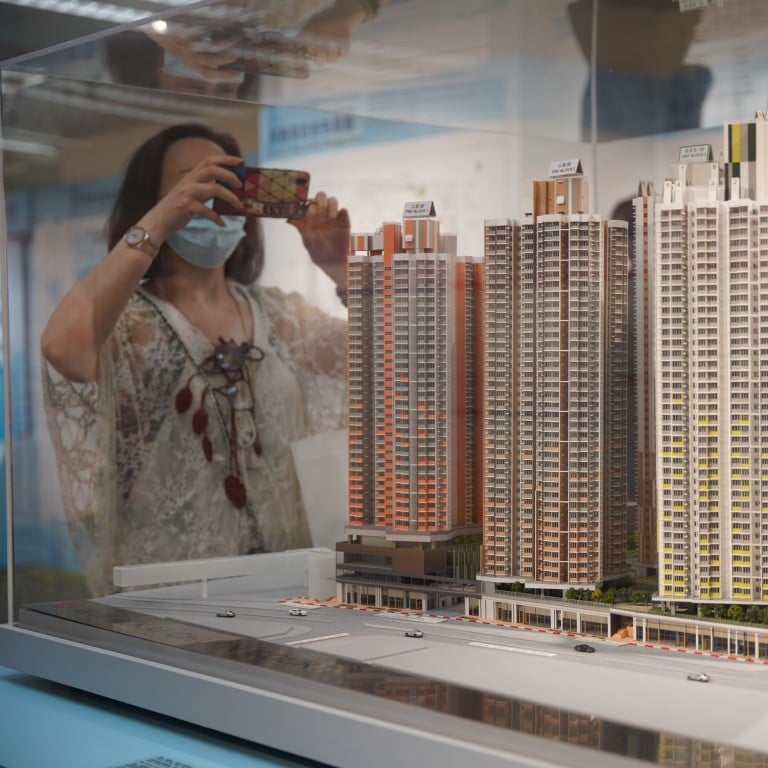
Hong Kong considering new mortgage scheme that would slash payments, monthly instalments for subsidised flats, city leader says
- So-called progressive payment scheme would see down payments and monthly instalments roughly halved
- Chief Executive Carrie Lam says government hopes to allow residents, including those waiting for public housing, to ‘leapfrog’ renting and purchase homes instead
Hong Kong is considering a new mortgage scheme for subsidised flats that would slash down payments by half and allow buyers to defer some of the debt in a bid to make homes more affordable, the city’s leader has said.
Speaking to the media, Chief Executive Carrie Lam Cheng Yuet-ngor said on Wednesday the government hoped to enable residents, including those waiting to be allocated public housing, to “leapfrog” renting and purchase homes instead.
Lam was referring to a so-called progressive payment mortgage mechanism introduced as part of a subsidised home scheme launched by property firm New World Development last month.
New World Development launches subsidised housing for lower income groups
Under the developer’s scheme, which covers 300 flats, buyers’ mortgages will be split into two phases. In the first, the buyer will make a down payment of 5 per cent of the total price, as opposed to the customary 10 per cent, then take out a mortgage of up to 30 years for 45 per cent of the unit’s value, as opposed to the usual 90 per cent.
They then have 10 years from the date of the initial transaction to either pay off the remaining 50 per cent without borrowing, either in instalments or all at once, or take out another mortgage to cover it.
The arrangement theoretically allows those who are able to save to pay off the second half of the flat without needing another loan, or alternatively, to defer the debt to a later date when they are earning more and are better able to pay it.
For example, the down payment on a 280 sq ft flat in North Point sold as part of this year’s batch of subsidised homes for HK$2.48 million (US$318,000) would ordinarily be HK$248,000.
Under the proposed new scheme, the down payment for the same unit would only be HK$124,000. The progressive arrangement would also see the amount of the monthly mortgage payments sharply reduced.

Applying the arrangement to government-subsidised homes, Lam said, would ease the debt burden for homebuyers and incentivise residents to “earn more” without fear of exceeding the income limit for those applying for public housing.
“If they make more money with hard work, they can take ownership of the entire unit as soon as possible,” Lam said, describing the plan as a model of the “Lion Rock spirit of self-reliance”.
Hong Kong is the world’s least affordable housing market, and a local family would need to save for 20.8 years to afford a home in the city, according to the annual Demographia International Housing Affordability Study.
Meanwhile, the average waiting time for a public rental flat has edged upwards to 5.9 years, a 22-year high, with many families forced to live in cramped subdivided units while they wait.
The number of families living in such substandard housing is expected to hit a record high of 127,100 over the next decade, according to government figures.
Beijing has called the city’s housing shortage a deep-seated problem that must be addressed, with the director of the State Council’s Hong Kong and Macau Affairs Office, Xia Baolong, setting a target for the city to “bid farewell” to subdivided flats and cage homes by 2049.
Hongkongers in subdivided flats enjoy cap on rent increases in new law
Francis Lam Ka-fai, vice-president of the Institute of Surveyors and its spokesman on housing policy, said he supported the scheme but raised a concern about the financial burden created.
“Part of the profit from selling the subsidised homes could be delayed for years, which would affect the cash flow of the Housing Authority,” he said. “After all, The authority will need more money from the government to run the schemes. ”
The last phase of the Home Ownership Scheme offering about 7,000 affordable homes was oversubscribed more than 33 times.
Lawrence Poon Wing-cheung, a real estate policy expert at City University, predicted the situation would only intensify as more buyers would be interested in those flats under the new policy.
“Since there is no change on the housing supply, the queue will inevitably get longer, and the chance for the applicants getting a flat will be smaller,” he said.
But Poon added: “The game will hopefully be fairer than it used to be as more people are welcome to join the scheme and it will become easier for them to pay the loan.”
In the long term, the government should still increase the supply of subsidised flats to solve the housing crisis, he said.

